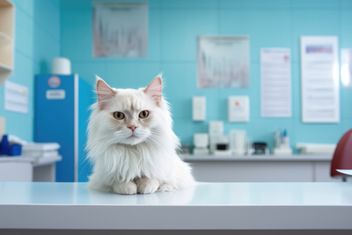How to Deal with Kidney Disease in Cats
January 12, 2022
The Inside Rx Blog
Get the Inside Scoop on tips & tricks that may help your family save on prescriptions!
Subscribe to stay up to date with the latest news and tips
If your cat has been diagnosed with kidney disease, just know it’s not the end of the world. Since your cat might not be feeling their best, this is a critical time to ensure you’re taking the best care of your feline friend. After all, your cat is counting on you.
Chronic kidney disease in cats is quite common, especially in older cats over 12 years of age. It has been estimated that between 35% and 81% of older cats may be affected by kidney disease. Thankfully, treatment options like medication along with a few tweaks in diet and routine can help manage kidney disease in cats.
What is kidney disease in cats?
The kidneys act as a filter system for your cat's body, helping get rid of toxins and waste from the blood. These toxins and waste products are cleared from the body in the form of urine. Signs and symptoms of kidney disease may not be apparent until the disease has already progressed.
If your cat has kidney disease, you may see signs and symptoms such as:
- Weight loss
- Weakness
- Changes in appetite
- Vomiting
- Diarrhea
- Ulcers in the mouth
- Depression
- Poor hair quality
- Increased thirst
- Increased urination
What causes chronic kidney disease can be hard to pinpoint. But some causes of kidney problems in cats include poisons, infections, and kidney tumors. If kidney disease, or kidney failure, is suspected, a veterinarian will typically diagnose it through blood tests and other labs. Blood tests can help diagnose the condition and monitor for complications of CKD, such as anemia and high blood pressure.
Diagnostic tests usually measure the amount of urea and creatinine in the blood. These substances are often elevated if the kidneys aren’t working correctly. The vet may also perform a urinalysis to assess the amount of these substances in the urine. They might also look for a loss of proteins in the urine (proteinuria). In addition to blood and urine tests, a vet may order an ultrasound or x-ray to examine your cat further.
Managing kidney disease in cats
The treatment of kidney disease in cats will depend on the severity of the disease, and it often involves different aspects, such as diet, supplements, and medications. You can work with your veterinarian to determine the best treatment or combination of treatments for your cat.
Diet
Your cat may need to be on a special diet with low protein and low phosphorus. These diets can help reduce the number of waste products in the blood, which can help reduce the stress on your cat’s kidneys.
Supplements
Cats with kidney disease may lose significant amounts of potassium, iron, vitamin B and C through urination. Supplements and vitamins may be recommended to help offset these losses.
Hydration
Your cat’s kidneys may compensate for the excess waste products in the blood by excreting more fluid in the urine. This can lead to dehydration, so make sure your cat has enough water. Since water can be supplemented through a cat’s diet, a vet may recommend tinned or sachet foods instead of dry foods to help with this.
Medication
If phosphate can’t be lowered with diet only, an oral phosphate binder like aluminum hydroxide may be recommended to help absorb excess phosphorus in the gut. Cats with kidney disease also experience high blood pressure, anemia, and nausea or vomiting. Prescription medications may be given to help treat these complications.
Losartan Potassium
$ 7.84Lisinopril
$ 9.80Getting your cat the treatment they need
Fortunately, with the right treatment, your cat can have an active, quality life. Costs for kidney disease treatment can be costly, however. In some cases, pet insurance will help cover the costs of treatment. Otherwise, you may have to pay upfront to treat your cat.
You can save on the costs of your cat’s treatment through a number of options, such as a prescription discount card. TheInside Rx Pets discount card helps cover the cost of brand and generic medications for pets. You can even save up to 75% on prescriptions for your cat. Instantly download or print the Inside Rx Pets savings card and take it to your nearest pharmacy to see if you can save on your cat’s kidney disease medication.
Did you know? A common condition that elderly animals experience is kidney disease in cats. Luckily, if your cat is diagnosed with kidney disease, it can be managed quite easily. Read on to learn more about kidney disease in cats and how to treat it.



